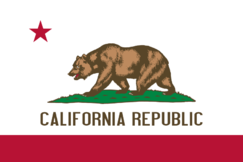California "Raise California's Wage and Paid Sick Days Act" $15 Minimum Wage Initiative (2016)
| "Raise California's Wage and Paid Sick Days Act of 2016" | |
|---|---|
 | |
| Election date November 8, 2016 | |
| Topic Minimum wage | |
| Status Not on the ballot | |
| Type State statute | Origin Citizens |
A $15 per hour minimum wage initiative called the "Raise California's Wage and Paid Sick Days Act of 2016" (#15-0105A1) was not put on the ballot as an initiated state statute for voters in California on November 8, 2016.
Initiative measure 15-0105, which was supported by Service Employees International Union's California Council, was designed to increase the wage to $15 by 2020.[1][2][3]
On March 26, 2016, California legislators proposed legislation which was designed to raise the statewide minimum wage gradually until it reached $15 in 2022. Lawmakers achieved an agreement with the union behind the "Fair Wage Act of 2016" regarding this alternative legislation.[6]
On March 31, 2016, the California Legislature passed the alternative legislation, Senate Bill 3, and sent it to the desk of Gov. Jerry Brown (D). Gov. Brown signed the alternative legislation bill into law on April 4, 2016. Both California Council of SEIU and SEIU-UHW approve of the bill's stipulations, and the Fair Wage Act of 2016 (#15-0032), was withdrawn in June 2016.[5][7][8][9]
Service Employees International Union's California Council told the Monterey Herald on April 1, 2016, that it had stopped gathering signatures for Raise California's Wage and Paid Sick Days Act of 2016 (#15-0105A1).[10]
Competing measures
The Service Employees International Union-United Healthcare Workers West (SEIU-UHW) and California's state council of the Service Employees International Union (SEIU) were divided by their efforts to sponsor competing $15 per hour minimum wage initiatives. SEIU-UHW, which represents about 80,000 healthcare workers in California, put its weight behind the "Fair Wage Act of 2016," which was designed to raise the state's minimum wage in increments until it reached $15 per hour in 2021. This initiative was certified for the ballot on March 22, 2016. According to Laphonza Butler, president of the state council of SEIU, petitioners continued signature collection efforts for the union's competing
initiative, the "Raise California's Wage and Paid Sick Days Act," despite the certification of the initiative backed by the United Healthcare Workers union. SEIU California stopped its signature gathering campaign after the California State Legislature approved and the Governor signed a $15 per hour minimum wage bill called Senate Bill 3. The state council's proposal was designed to increase the minimum wage to $15 per hour by 2020 for businesses with more than 25 workers. Smaller businesses would have been given until 2021 to increase their minimum pay to $15 per hour. The initiative was also written to allow all workers to earn a minimum of six paid sick days each year, rather than the three required as of March 2016. SEIU California represents about 700,000 employees and was the largest union in the state in 2016.[11][12]
If both initiatives had reached the ballot and were approved, the one with the most "yes" votes would entirely supersede the other.
Background
Senate Bill 3
In mid-March 2016, California legislators moved toward an agreement with the unions behind the competing 2016 minimum wage initiatives. If approved by the legislature, the proposed alternative, Senate Bill 3, was designed to gradually increase the statewide minimum wage until it reached $15 in 2022, with the wage tied to inflation thereafter. Businesses with fewer than 25 employees were given until 2023 to raise minimum wages to $15 per hour by the bill. The bill was also designed to allow the governor to delay minimum wage hikes in the event of an economic decline. Senate Bill 3 was given final approval by the California State Legislature on March 31, 2016. The legislature voted along party lines, with every "yes" vote on SB 3 coming from a Democratic lawmaker and all but two "no" votes coming from Republicans. Gov. Jerry Brown (D) signed SB 3 into law on April 4, 2016.[6][13][14]
SEIU-United Healthcare Workers West, the sponsoring group behind the "Fair Wage Act of 2016" initiative, which qualified for the November ballot on March 22, 2016, was involved with negotiations surrounding the approved legislation. Petitioners announced that they would likely withdraw their $15 per hour minimum wage initiative upon the enactment of Senate Bill 3. SEIU-United Healthcare Workers West spokesman, Sean Wherley, told KCRA News 3, however, that the organization would continue to “push ahead” with the Fair Wage Act until the bill was actually signed into law: “Ours is on the ballot. We want to be certain of what all this is...We are going ahead with it. If some agreement is signed into law, then our executive board would decide what to do. They would only make that decision after any agreement is signed into law.”
SEIU-United Healthcare Workers West was supposed to meet in early May in order to decide whether the initiative would be withdrawn in light of the governor's signing of SB 3, and the SEIU-UHW executive board did issue a resolution encouraging proponents to withdraw the measure on May 5, 2016.[13][15][16] On June 23, 2016, the "Fair Wage Act of 2016" was withdrawn from the ballot, according to the California secretary of state.[5] The state council of SEIU withdrew its initiative on April 1, 2016.[10]
Text of measure
Ballot title
The ballot title is as follows:[17]
| “ | Minimum Wage. Increases and Future Adjustments. Paid Sick Leave. Initiative Statute.[18] | ” |
Ballot summary
The ballot summary is as follows:[17]
| “ | Annually increases minimum wage paid by employers with 26 or more employees until it reaches $15.00 per hour on July 1, 2020. For employers with 25 or fewer employees, annually increases minimum wage until it reaches $15.00 per hour on July 1, 2021. Thereafter, adjusts minimum wage annually based on prior year’s rate of inflation, using California Consumer Price Index for Urban Wage Earners and Clerical Workers. Increases minimum amount of annual paid sick leave employees can earn and may use from three to six days. Effective January 1, 2018, applies minimum sick leave provisions to in-home supportive services providers.[18] | ” |
Fiscal impact statement
Note: The fiscal impact statement for a California ballot initiative authorized for circulation is jointly prepared by the state's legislative analyst and its director of finance.
The fiscal impact statement is as follows:[19]
| “ | Change in annual state and local tax revenues potentially ranging from a loss of hundreds of millions of dollars to a gain of over $1 billion. Changes in state revenues would affect required state budget reserves, debt payments, and funding for schools and community colleges. Net increase in state and local government spending totaling billions of dollars per year. Cost increases, primarily for government employees and home care providers, would be offset in part by savings from lower enrollment in health and social services programs.[18] | ” |
Full text
The full text of the measure can be found here.
Support
- SEIU state council[3]
- Lieutenant Governor Gavin Newsom (D)[20]
A Raise the California Wage campaign and website were funded by SEIU California.[21]
Arguments in favor
Kristin Lynch, a spokeswoman for SEIU Local 1021, argued:[22]
| “ | We are doing our own thing because we think this initiative is sufficiently different. We are prepared at this point to put in, with our coalition partners, the $20 million to $30 million that we know we’ll need to make this a winning initiative.[18] | ” |
Path to the ballot
| Voting on Minimum Wage | |||
|---|---|---|---|

| |||
| Ballot Measures | |||
| By state | |||
| By year | |||
| Not on ballot | |||
|
- Shonda Roberts and Bruce Boyer submitted a letter requesting a title and summary for measure on November 3, 2015.[2]
- A title and summary were issued by California's attorney general on January 7, 2016.
- 365,880 valid signatures were required for qualification purposes.
- Supporters had until July 5, 2016, to collect the required signatures.
- Service Employees International Union's California Council announced that would stop gathering signatures for the measure on April 1, 2016.
Related measures
On the ballot in 2016
- Arizona Minimum Wage and Paid Time Off, Proposition 206 (2016) - Approved
- South Dakota Decreased Youth Minimum Wage Veto Referendum, Referred Law 20 (2016) - Defeated
- Washington Minimum Wage Increase, Initiative 1433 (2016) - Approved
- Colorado $12 Minimum Wage, Amendment 70 (2016) - Approved
- Maine Minimum Wage Increase, Question 4 (2016) - Approved
See also
External links
Support
Footnotes
- ↑ California Attorney General, "Letter requesting a ballot title for Initiative 15-0032," April 27, 2015
- ↑ 2.0 2.1 Attorney General's Office, "15-0105," accessed December 1, 2015
- ↑ 3.0 3.1 San Francisco Examiner, "Two unions battle for $15 hourly minimum wage in California," November 3, 2015
- ↑ Sacramento Business Journal, "$15 minimum-wage measure qualifies for November ballot," March 23, 2016
- ↑ 5.0 5.1 5.2 California Secretary of State, "Initiatives and Referenda Failed to Qualify," accessed June 24, 2016
- ↑ 6.0 6.1 Los Angeles Times, "Deal reached to boost California's minimum wage to $15, avoiding ballot box battle," March 26, 2016
- ↑ ABC News, "California Enacts Highest Statewide Minimum Wage in US," April 4, 2016
- ↑ Davis Vanguard, "Minimum Wage Hike Passes Legislature, Awaits Governor’s Signature," April 1, 2016
- ↑ Open States, "California Senate Bill 3," accessed April 1, 2016
- ↑ 10.0 10.1 Monterey Herald, "California union halts minimum wage drive with law pending," April 1, 2016
- ↑ Sacramento Business Journal, "Statewide $15 minimum wage initiative approved for November ballot," March 23, 2016
- ↑ Sacramento Business Journal, "$15 minimum-wage measure qualifies for November ballot," March 23, 2016
- ↑ 13.0 13.1 KCRA News 3, "Deal reached to take California minimum wage to $15 an hour," March 27, 2016
- ↑ ABC News 4, "California Enacts Highest Statewide Minimum Wage in U.S.," April 4, 2016
- ↑ SEIU-UHW, "Encouraging Withdrawal of a $15 Minimum Wage in Lieu of Legislation that Lifts Up Millions of California Workers RESOLUTION 21-16," accessed June 23, 2016
- ↑ SEIU-UHW, "Press Release Archive," accessed June 23, 2016
- ↑ 17.0 17.1 Attorney General's Office, "Initiative 15-0105," accessed January 11, 2016
- ↑ 18.0 18.1 18.2 18.3 Note: This text is quoted verbatim from the original source. Any inconsistencies are attributable to the original source.
- ↑ Attorney General's Office, "Fiscal Impact Estimate Report," accessed December 1, 2015
- ↑ The Sacramento Bee, "Playing the odds, Gavin Newsom endorses rival minimum wage hikes," January 19, 2016
- ↑ Raise the California Wage, "Home," accessed March 24, 2016
- ↑ The Sacramento Bee, "SEIU starts competing effort to put minimum wage on California ballot," November 3, 2015
| ||||||||||||||
| |||||||||||
 |
State of California Sacramento (capital) |
|---|---|
| Elections |
What's on my ballot? | Elections in 2025 | How to vote | How to run for office | Ballot measures |
| Government |
Who represents me? | U.S. President | U.S. Congress | Federal courts | State executives | State legislature | State and local courts | Counties | Cities | School districts | Public policy |

